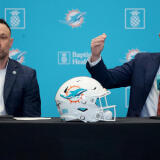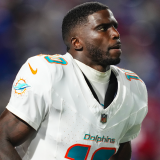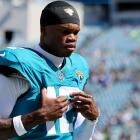Agent's take: The financial ramifications of Marvin Harrison Jr.'s decision about the 2024 NFL Draft
Harrison left the door open on returning to Ohio State, but that doesn't make sense financially

Eighty-two underclassmen declared for the 2023 NFL Draft, which included 13 players who left school with remaining eligibility after getting their college degrees. One player who should have an easy decision about the 2024 draft is Ohio State junior wide receiver Marvin Harrison Jr.
The 2023 consensus All-American left the door open about remaining in school last week. Harrison mentioned unaccomplished goals of beating Michigan and winning a Big Ten championship as motive to return for his senior season.
Most college players with aspirations to play in the NFL leave school at the earliest possible instance if a high draft status has been solidified. Harrison has done that. He is considered a sure-fire top-five pick. Most mock drafts have Harrison going no lower than the third overall pick.
A wide receiver hasn't gone that early since 2007 when Hall of Famer Calvin Johnson was the second player selected by the Lions. The last wide receiver to be the first player taken was Keyshawn Johnson with the Jets in 1996.
The NCAA allowing collegiate athletes to start profiting off their name, image and likeness in 2021 is a new variable in the equation about turning pro early, particularly in basketball and football. From a pure economic standpoint, Harrison's decision can be quantified.
Alabama edge rusher Will Anderson Jr. was taken third in this year's draft by the Texans. He signed a fully guaranteed four-year, $35,212,818 rookie contract, which included a $22,609,320 signing bonus. Teams have an option for a fifth year with first-round picks that must be exercised after the third year of the deal.
There's been a 1% increase in signing bonuses with draft picks in recent years. Assuming this holds true again, 2024's third overall pick will get a $22,835,412 signing bonus. Between this signing bonus and a $795,000 2024 base salary, Harrison would need to make $23,630,412 in NIL money just to break even to play college football again. His fully guaranteed four-year rookie contract would be worth $35,771,192.
This would be an unprecedented amount of NIL money. According to On3, USC basketball player Bronny James has the highest NIL valuation among NCAA athletes at $5.9 million.
This doesn't take into consideration Harrison delaying for a year when he could start making his fair market value by staying in school since rookie contracts are "slotted" and determined by draft position. Entering the 2024 draft would not only potentially extend Harrison's professional career by a year but would put him on track for free agency a year earlier. Doing so creates the prospect of significant additional career earnings.
The average yearly salary for starting wide receivers who aren't on rookie contracts is currently a little more than $13.1 million, according to NFLPA data. This figure increases to just over $19.5 million per year when looking strictly at No. 1 wide receivers on veteran contracts. Harrison would be eligible for a contract extension in 2027 by declaring for the upcoming draft.
It's conceivable that the average yearly salary for a No. 1 wide receiver on a veteran contract could be approaching $25 million per year, which is close to a 30% increase, by then. This may be a conservative projection considering the average for such players has gone up 36.4% since 2019.
Harrison doesn't have financial pressure to turn pro because of family circumstances, which can be an important consideration for some players. He's in a much different boat because of his father. Marvin Harrison, Sr. is a Hall of Fame wide receiver, who was once the NFL's highest-paid player at the position. His career earnings from his NFL player contracts over his 13-year career (1996-2008) were just under $67 million.
Harrison could protect himself in returning to school with career-ending disability insurance that also has a loss of value component. With loss of value coverage, Harrison would start receiving a payout if he dropped below a predetermined projected position in the 2025 draft.
Harrison might not have a precipitous drop with a serious injury next season. Alabama wide receiver Jameson Williams was 2022's 12th overall pick after tearing his left ACL that January during the College Football Playoff National Championship Game. He was the fourth wide receiver taken in 2022 instead of potentially being the first, which was Drake London as the eight overall pick by the Falcons. The difference this year in being the third pick and the 12th pick is just under $17.4 million.
Harrison's worst nightmare would be a Bryce Love-type scenario. Love was the Heisman Trophy runner-up in 2017 because of a junior season in which he rushed for 2,118 yards with 19 touchdowns while averaging 8.1 yards per carry.
Love returned to Stanford although he was a potential late first-round pick. A disappointing senior year in which Love, who was slowed by a nagging ankle injury, had 739 rushing yards with 4.5 yards per carry ended in the regular season finale against California when he tore his right ACL.
The Commanders selected Love in the fourth round of the 2019 draft. A cleanup surgery was necessary during Love's rookie season. He kept having problems with the knee and never played a down before being released in 2021.
It would be a major surprise if Harrison didn't declare for the 2024 draft. Harrison has likely played his last game for Ohio State. There wouldn't be an expectation for Harrison to play in the Cotton Bowl against Missouri although quarterback Bryce Young, 2023's first overall pick, and Anderson did for Alabama against Kansas State last New Year's Eve in the Sugar Bowl. The recent trend has been for highly regarded draft prospects to skip bowl games.
Harrison has infinitely more to lose than gain by coming back to Ohio State. He has essentially already maximized his draft position given the history of where wide receivers have been taken over the past 30 years.
There isn't much left for Harrison to accomplish individually. He just won the Biletnikoff Award for the nation's most outstanding college football wide receiver. Harrison finished fourth in the Heisman Trophy balloting. Wide receivers rarely win the award. It had been 30 years since a wide receiver had won when Alabama's DeVonta Smith did in 2021.
It's hard to imagine there realistically being enough NIL money to make staying worth it to Harrison considering the current landscape. Even if there is, Harrison would have an extremely difficult time making up the money he lost by putting his NFL career on hold and pushing free agency back a year. It would be virtually impossible with Harrison coming remotely close to living up to his expected draft position once in the NFL given the anticipated growth in the salary cap and player salaries in the coming years.
For more draft coverage, you can hear in-depth analysis twice a week on "With the First Pick" -- our year-round NFL Draft podcast with NFL Draft analyst Ryan Wilson and former Vikings general manager Rick Spielman. You can find "With the First Pick" wherever you get your podcasts: Apple Podcasts, Spotify, YouTube, etc.

















